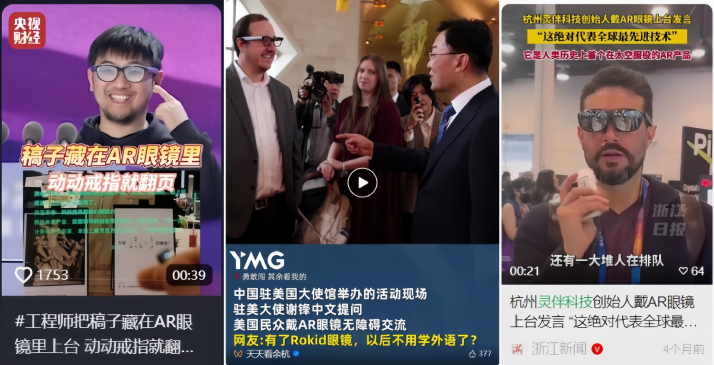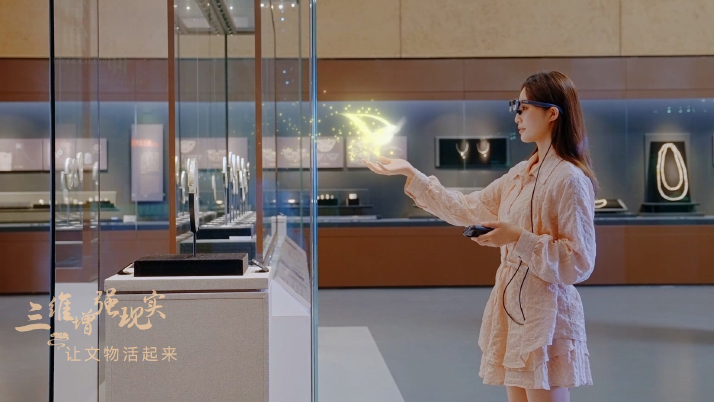| Business |
| A Hangzhou-based firm bridges technology and culture | |
|
|
 A customer tests tech company Rokid's groundbreaking payment-enabled smart glasses feature, a world-first innovation, during a demonstration at a supermarket in Hangzhou, Zhejiang Province, on June 17 (COURTESY PHOTO)
Hangzhou, a city steeped in Song Dynasty (960-1279) elegance yet pulsating with digital DNA, is nurturing China's next generation of tech pioneers. As Hangzhou-based DeepSeek's open-source code reshapes the global AI landscape, companies like Rokid, a Chinese augmented reality (AR) technology provider also based in Hangzhou, are no longer content with isolated technological breakthroughs. Instead, they have embedded cutting-edge innovation within the fertile soil of industry and the rich veins of culture, tackling a more fundamental question: How can technology genuinely serve humanity and become a bridge for civilizational dialogue?  Screenshots of Rokid's real-world application scenarios implemented in the first half of 2025 (COURTESY PHOTO)
Jiang Tao, Rokid's Vice President, told Beijing Review that the company, established in 2014, began an exploration into the cultural dimension in 2020 at a 5,000-year-old Neolithic cultural site in north Hangzhou: Liangzhu. Now, with the company's AR technology, visitors to the Liangzhu Museum can watch cultural relics through a pair of AR glasses, and see virtual images that help them visually perceive the information behind the relics. When the curator of the Liangzhu Museum saw the AR images of the ancient divine emblem on a jade cong—an ancient jade tube with a quadrilateral exterior and a circular inside that was used in ancient rituals, he exclaimed, "You brought the artifacts to life!" The Liangzhu revelation Rokid was originally known for its industrial AR gears. Back then, its rugged, explosion-proof headsets were used in oil and gas mines. Boasting over 200 patents and products sold in more than 70 countries, its technology was mature—yet somehow lacked warmth. The Liangzhu project became a watershed moment. "We suddenly realized AR's core value isn't just about boosting efficiency or ensuring safety," Jiang recalled. "It can also integrate with history and culture." Jiang described their approach to animating the static jade bi disc, a flat disc with a central hole: deliberately avoiding flashy effects that might overshadow the artifact itself. Instead, subtle animations in the adjacent space illustrated the symbolic meaning of the artifact's bird motifs. "Visitors once saw mere patterns; now they can grasp the cultural code behind them. Technology should complement, not replace or disrupt," Jiang said. The AR technology has now been replicated across 200-plus museums and heritage sites nationwide. The company has received a lot of feedback, while Jiang treasures one response above all: the involuntary "Wow!" from visitors, young and old. It is an instant understanding and connection sparked when technology precisely illuminates long-dormant history.  Liangzhu artifacts viewed through Rokid's augmented reality-powered glasses at the Liangzhu Museum in Hangzhou (COURTESY PHOTO)
Tech meets culture Rokid's connection with cultural heritage is no outlier. In Hangzhou, digital giants neighbor cultural heritage sites, which gives rise to a unique marriage between innovation and heritage protection. "This city is home to [leading tech companies] Alibaba and NetEase, yet equally to cultural sites such as Liangzhu, the Grand Canal and West Lake," Jiang said. He credits the government and cultural institutions for their forward-looking embrace of technology. Local museums such as the Liangzhu Museum share precious artifact data, and researchers and engineers worked intensely to accurately present these data vividly. This win-win model epitomizes Hangzhou's fusion of tech and culture. In addition to bridging the past and present in museums, Rokid's AR technology has also bridged cultures. This May, at the Modern China exhibition hosted by the Chinese Embassy in the United States in Washington, D.C., an American citizen wearing Rokid Glasses conversed seamlessly with Ambassador Xie Feng, with the help of real-time bilingual subtitles projected through the glasses. Integrating a Qualcomm chip, Sony sensors, Lens Technology's specialty glass and the DeepSeek large language model, the glasses revealed their true value: technology as a practical tool bridging language divides and enabling civilizational dialogue. In June in Hangzhou, mere weeks later, this Hangzhou-based firm announced another breakthrough: the world's first payment-enabled smart glasses. It targeted a ubiquitous offline friction point: slow payments at crowded venues like mall checkouts or popular restaurants. Traditional methods force users to pull out phones, unlock, open apps and scan—a tedious sequence that bogs down flow during peak hours. Rokid Glasses have integrated Alibaba's e-wallet Alipay's "One-Look Payment." Users simply glance at the merchant's QR code, say "Rokid, please pay XX yuan," and then they will see the transaction on their lenses. This entirely hands-free and phone-independent payment has demonstrated a form of AR deeply woven into daily life, solving concrete efficiency gaps. In Hangzhou, Rokid's story is one chapter in the shared narrative of the "Six Tigers." Its journey reflects a broader shift among Hangzhou's "Six Tigers," from technical prowess to contextual breakthroughs. The Six Tigers are six tech pioneers in Hangzhou—robotics firms Unitree Robotics and Deep Robotics, AI startup DeepSeek, spatial intelligence company ManyCore, brain-machine interface firm BrainCo and video game developer Game Science. DeepSeek dismantles language barriers with computing power; Unitree Robotics integrates robots into daily life; Game Science's action game Black Myth: Wukong retells Eastern myths through ingenuity; Rokid builds bridges of understanding between the real and virtual—spanning 5,000-year-old cultural codes, crossing Pacific language divides, or shortening those payment seconds. Together, they signal a shift: The next phase of China's tech innovation is moving beyond specs competition toward deeper industrial roots, heightened humanistic sensitivity and pragmatic responses to global needs. In Hangzhou, technology is finding its most authentic role: not as a disruptor, but as a "translator" of civilization and an enabler of efficiency in daily life. Through synergy and a focus on context, the city's tech pioneers quietly reshape how we perceive the world and connect with one another. BR Printed edition title: Where AR Has a Soul Copyedited by Elsbeth van Paridon Comments to taozihui@cicgamericas.com |
|
||||||||||||||||||||||||||||||
|